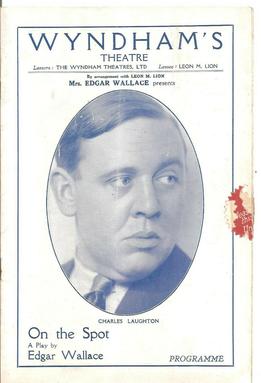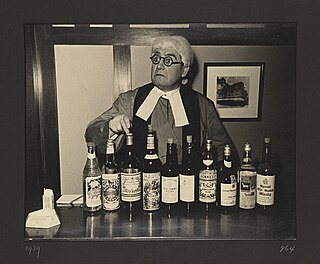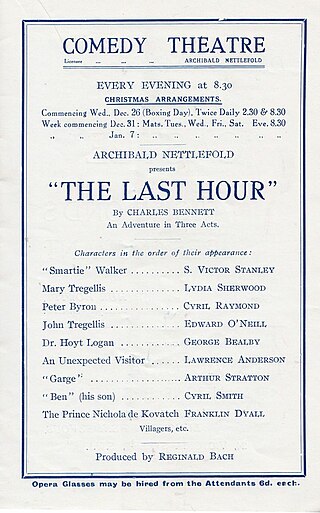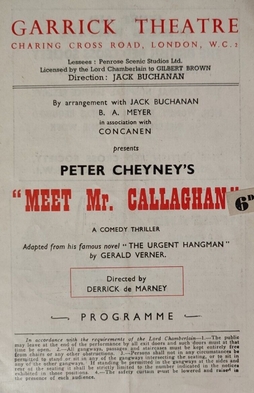
The Embassy Theatre is a theatre at 64 Eton Avenue, Swiss Cottage, in the London Borough of Camden, England.
Bernard Lee (1908–1981) was an English actor who performed in many light entertainment media, including film, television and theatre. His career spanned from 1934 to 1981, although he made his first appearance on the stage at the age of six. He is perhaps best known for playing M in the first eleven Eon-produced James Bond films.
Ten Minute Alibi is a 1935 British crime film directed by Bernard Vorhaus and starring Phillips Holmes, Aileen Marson and Theo Shall. It was made at Beaconsfield Studios. The film's sets were designed by the art director Andrew Mazzei. It is an adaptation of the Ten Minute Alibi by Anthony Armstrong.

On the Spot is a 1930 Chicago-set play by the British writer Edgar Wallace. Wallace was inspired by a visit to the United States and, in particular, the Saint Valentine's Day Massacre. Known as a prolific author, he reportedly dictated the manuscript for the play in just four days. It was his greatest theatrical success.
The Mouthpiece is a 1930 crime play by the British writer Edgar Wallace. It was one of several theatrical failures written by Wallace following the enormous success of On the Spot, with a plot described as "flimsy".
The Old Man is a 1931 mystery play by the British writer Edgar Wallace. Its original production was staged at Wyndham's Theatre in London's West End for a ninety performance run. It is set entirely in the "Coat of Arms" tavern where a mysterious old man lurks in the background, reputedly an escapee from a lunatic asylum. The original cast included Alfred Drayton, Jack Melford, Harold Warrender and Finlay Currie.
Persons Unknown is a 1929 mystery play by the British writer Edgar Wallace. The plot revolves around the murder of a "person unknown" in a street by a mysterious blackmailer. It features the character of Sergeant Elk, a Scotland Yard detective who appeared in several of Wallace's novels.
The Terror is a 1927 mystery thriller play by the British writer Edgar Wallace. It is based on Wallace's 1926 novel The Black Abbot.
Smoky Cell is a thriller play by the British writer Edgar Wallace first staged in 1930. In America a group of detectives hunt down a notorious racketeer.

The Unguarded Hour is a 1935 play by Bernard Merivale, inspired by a Hungarian work by Ladislas Fodor.
Bernard Merivale (1882–1939) was a British playwright and screenwriter.
None But the Brave is a 1925 farcical melodramatic play by the British writers Bernard Merivale and Brandon Fleming in which a man inherits the estate of a wealthy uncle, and has to avoid being framed for murder by his relatives.

Blondie White is a 1937 mystery play by British writer Jeffrey Dell and Bernard Merivale. A murder mystery, it was inspired by an earlier play by Hungarian writer Ladislas Fodor. A famous crime novelist helps Scotland Yard to solve the murder of a nightclub performer, Blondie White.

The Amazing Dr. Clitterhouse is a 1936 thriller play by the British writer Barré Lyndon. The lead character's name is a play on the term for the female sexual organ the clitoris - a name characterised by the "yearning, untrammelled nature" of Clitterhouse himself; an extremely daring pun for 1936, yet seemingly anticipated by Lyndon to escape the notice of the contemporary censor. Lyndon wrote, "My view was that he was no more likely to locate the pun in my title as to locate the source of it on his beloved bedfellow".

The Last Hour is a 1928 comedy thriller play by the British writer Charles Bennett. At an inn on the coast of Devon, a secret agent battles a foreign prince trying to smuggle a stolen death ray out of the country.

Blackmail is a 1928 thriller play by the British writer Charles Bennett. The plot is about an artist's model in Chelsea who kills an artist when he attempts to assault her.

The Holly and the Ivy is a 1950 play by the British writer Wynyard Browne. A vicar attempts to deal with the various problems of his family as they gather for the Christmas period.

Meet Mr. Callaghan is a 1952 crime thriller play by the British writer Gerald Verner. It was adapted from the novel The Urgent Hangman by Peter Cheyney featuring the private detective Slim Callaghan. It premiered at the Kings Theatre in Southsea before transferring to the Garrick Theatre in London's West End where it ran for 340 performances between 27 May 1952 and 4 April 1953. The cast included Terence De Marney as Callaghan, Larry Burns, Jack Allen, Trevor Reid, John Longden, Lisa Daniels, Harriette Johns and Simone Silva. In 1953 Verner wrote another stage play featuring Callaghan, Dangerous Curves based on Cheyney's novel of the same title.

Without Witness is a mystery thriller play by the British authors Anthony Armstrong and Harold Simpson. It premiered at the Embassy Theatre in Swiss Cottage on 27 December 1933 before transferring to the Duke of York's Theatre in London's West End where it ran for 75 performances between 12 March and 12 June 1934, having been revised slightly from its Embassy premiere. The West End cast included Nicholas Hannen, Arthur Wontner, Bernard Lee, Frederick Piper, Hugh E. Wright, Joan Marion and Marion Fawcett.

Murder Mistaken is a 1952 thriller play by the British author Janet Green. It first appeared at the Prince of Wales Theatre in Cardiff under the title Teddy Bare's Picnic. It then transferred to London's West End under its new title first at the Ambassadors Theatre and then at the Vaudeville Theatre. It's West End run lasted 156 performances between 4 November 1952 and 28 March 1953. The West End cast included Derek Farr, Anthony Marlowe, Phyllis Morris, Iris Hoey, Brenda de Banzie, Patricia Burke and Rosalie Crutchley. It appeared on Broadway under the alternative title Gently Does It, lasting for thirty seven performances at the Playhouse Theatre. Green wrote a novelisation in 1953 with Leonard Gribble.











